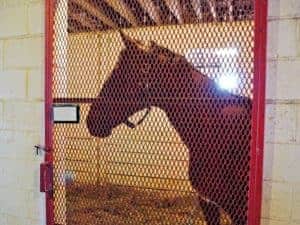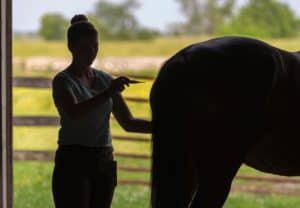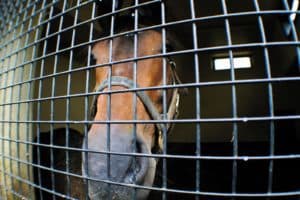Dressage Horse Detained After Positive Glanders Test
Sagacious HF is in extended quarantine in Miami pending the results of additional testing slated for Aug. 23.
Sagacious HF is in extended quarantine in Miami pending the results of additional testing slated for Aug. 23.

The Ark’s facilities are designed to eliminate the introduction of disease to the United States from imported horses.

Find tips on managing and preventing a “perfect storm” of infectious disease spread at horse competition facilities.
Officials believe some horses have contracted strangles. Testing is underway to confirm the diagnosis.

Controlling disease spread can be challenging. A veterinarian offers tips on how to react if your farm becomes infected.
A horse arriving from Europe produced.a “questionable” blood test result, but tested negative on a retest.

With EHV cases reported from California to Kentucky already in 2017, get information you need to protect your horse.

Don’t wait for another disease outbreak to brush up on your EHV-1 knowledge.

Implement appropriate biosecurity measures pre-emptively, as infectious disease is an ever-present risk with horses.

This potentially fatal infectious disease continues to challenge the horse industry, but our experiences are teaching us how to prevent its spread.

Equine influenza vaccination strategies evaluated in one study reduced new flu infections on average by 60%.

Strangles outbreaks can be devastating, but the damage can be minimized or prevented through practical control plans.
The bills are designed to strengthen control measures to better manage the risk of diseases entering Australia.

An equine disease outbreak can be dangerous for your horse and expensive for you. Protect your horse from infectious disease exposure by using tips from our step-by-step visual guide.

Is your horse showing clinical signs of an infectious disease? Here’s how to care for your horse and protect others in our step-by-step visual guide.

Remember these important steps if you’re faced with an infectious disease outbreak, regardless of what condition is at the center of the issue.
Stay on top of the most recent Horse Health news with
© 2022 Copyright Statement dolor sit amet, consetetur sadipscing User Terms, sed diam nonumy eirmod tempor invidunt ut labore et dolore magna aliquyam erat, sed diam voluptua. At vero eos et accusam et justo duo dolores et ea rebum. Stet clita kasd gubergren, no sea takimata sanctus est Lorem ipsum dolor sit amet.
"*" indicates required fields